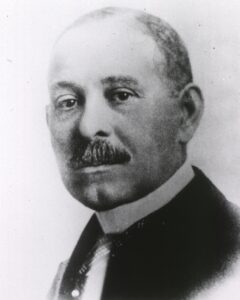 Typically, the stab wound that James Cornish received in his chest in Chicago in 1893 would have been fatal. But not this time, because Cornish had been rushed to Provident Hospital, where surgeon Daniel Hale Williams was on duty, ready to make history.
Typically, the stab wound that James Cornish received in his chest in Chicago in 1893 would have been fatal. But not this time, because Cornish had been rushed to Provident Hospital, where surgeon Daniel Hale Williams was on duty, ready to make history.
Operating without the benefit of x-rays, blood transfusions or other modern medical tools, Williams opened Cornish’s chest to discover a tear in his pericardium. In a procedure that had been done previously by only two surgeons, Williams performed what is now known as open-heart surgery. Cornish left the hospital a few weeks later and lived for decades more.
But it wasn’t just surgical skill that Daniel Hale Williams contributed to this story. It was also the hospital where Cornish was treated. Having been frustrated by the lack of hospitals that cared for Black citizens, trained Black physicians and nurses, and provided staff potions to Black healthcare professionals, Williams opened Provident Hospital and Training School for Nurses in 1891, creating the first Black-owned and Black-operated hospital in the U.S.
It’s unlikely that anybody could have predicted that Williams would have such an impact when he was a child. Born in Hollidaysburg, Penn., to a deeply religious barber and a clergyman’s daughter, 10-year-old Williams moved to Baltimore after his father died, and initially trained as a shoemaker’s apprentice. Later trying his hand at barbering – and even opening his own barbershop in Chicago – Williams eventually decided to go into medicine, training at the Chicago Medical College and opening a practice on the Windy City’s South Side.
Recognized for his skills as a leader and physician, in 1894 Williams was appointed chief surgeon of Washington, D.C.’s Freedmen’s Hospital, which had been founded to serve formerly enslaved Black people. Under his direction, the hospital turned around a high mortality rate, improved surgical procedures, launched an ambulance service and provided opportunities for Black healthcare professionals.
A few years later, Williams left Freedmen’s, taking his new wife to Chicago where he finished his career at Provident Hospital, Cook County Hospital and St. Luke’s Hospital. Suffering a stroke in 1926, Williams passed away in 1931 in Idlewild, Mich. Fellow surgeon Ulysses Grant Daily memorialized Williams as “a medical missionary,” adding that he was, “a veritable Moses in the Negro profession.”
